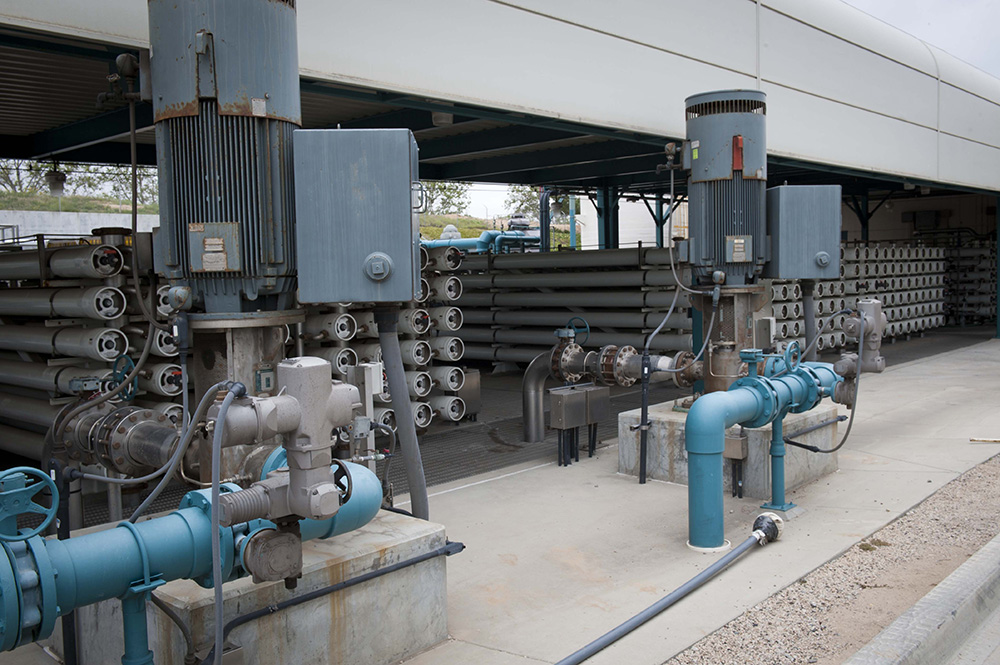Reclamation
>
News & Multimedia
>
news release
>
Reclamation selects nine water recycling and reuse projects to receive $16.6 million
news release ARCHIVE
 Reverse Osmosis plays a critical role in treating and reclaiming wastewater.
Return to top
Reverse Osmosis plays a critical role in treating and reclaiming wastewater.
Return to top
You are viewing ARCHIVED content published online before January 20, 2025. Please note that this content is NOT UPDATED, and links may not work. For current information, visit https://www.usbr.gov
Reclamation selects nine water recycling and reuse projects to receive $16.6 million
Projects in California and Hawaii will help communities stretch and diversify available water supplies
Media Contact:
Peter Soeth, 303-445-3615, psoeth@usbr.gov
For Release: Jun 8, 2020
 Reverse Osmosis plays a critical role in treating and reclaiming wastewater.
Reverse Osmosis plays a critical role in treating and reclaiming wastewater.
WASHINGTON - The Bureau of Reclamation is providing $16.6 million to nine congressionally authorized Title XVI Water Reclamation and Reuse projects. This funding, part of the WaterSMART Program, is for the planning, design, and construction of water recycling and reuse projects in partnership with local government entities.
"Title XVI projects develop and supplement urban and irrigation water supplies by reclaiming and reusing water," said Reclamation Commissioner Brenda Burman. "These projects assist communities with new sources of clean water, which increases water management flexibility and makes water supply more reliable."
The projects selected are:
City and County of Honolulu, Kalaeloa Seawater Desalination Project (Hawaii); $1,026,272
The City of Escondido, Membrane Filtration Reverse Osmosis Facility (California); $3,069,303
City of San Diego, Pure Water San Diego Program (California); $1,160,139
County of Hawaii, Kealakehe Wastewater Treatment Plant R-1 Upgrade Project (Hawaii); $1,459,056
Elsinore Valley Municipal Water District, Regional Wastewater Reclamation Facility Expansion Project (California); $1,397,974
Long Beach Water Department, Expansion of Recycled Water System and Improved Efficiency in Water Reclamation of the El Dorado Duck Pond (California); $1,217,829
Long Beach Water Department, Tanks 19 and 20 Conversion Project (California); $692,578
Mojave Water Agency, Upper Mojave River Groundwater Regional Recharge and Recovery Project Improvements (California); $2,659,802
Padre Dam Municipal Water District, East County Advanced Water Purification Program (California); $4,000,000
To view detailed project descriptions and to learn more about the Title XVI Water Reclamation and Reuse Program, please visit www.usbr.gov/watersmart/title/.
Through WaterSMART, Reclamation works cooperatively with states, tribes and local entities as they plan for and implement actions to increase water supply reliability through investments to modernize existing infrastructure and attention to local water conflicts. Visit www.usbr.gov/watersmart to learn more.
"Title XVI projects develop and supplement urban and irrigation water supplies by reclaiming and reusing water," said Reclamation Commissioner Brenda Burman. "These projects assist communities with new sources of clean water, which increases water management flexibility and makes water supply more reliable."
The projects selected are:
City and County of Honolulu, Kalaeloa Seawater Desalination Project (Hawaii); $1,026,272
The City of Escondido, Membrane Filtration Reverse Osmosis Facility (California); $3,069,303
City of San Diego, Pure Water San Diego Program (California); $1,160,139
County of Hawaii, Kealakehe Wastewater Treatment Plant R-1 Upgrade Project (Hawaii); $1,459,056
Elsinore Valley Municipal Water District, Regional Wastewater Reclamation Facility Expansion Project (California); $1,397,974
Long Beach Water Department, Expansion of Recycled Water System and Improved Efficiency in Water Reclamation of the El Dorado Duck Pond (California); $1,217,829
Long Beach Water Department, Tanks 19 and 20 Conversion Project (California); $692,578
Mojave Water Agency, Upper Mojave River Groundwater Regional Recharge and Recovery Project Improvements (California); $2,659,802
Padre Dam Municipal Water District, East County Advanced Water Purification Program (California); $4,000,000
To view detailed project descriptions and to learn more about the Title XVI Water Reclamation and Reuse Program, please visit www.usbr.gov/watersmart/title/.
Through WaterSMART, Reclamation works cooperatively with states, tribes and local entities as they plan for and implement actions to increase water supply reliability through investments to modernize existing infrastructure and attention to local water conflicts. Visit www.usbr.gov/watersmart to learn more.


